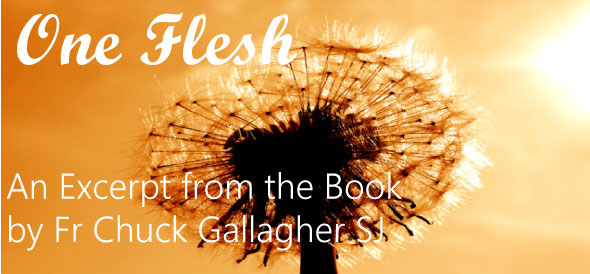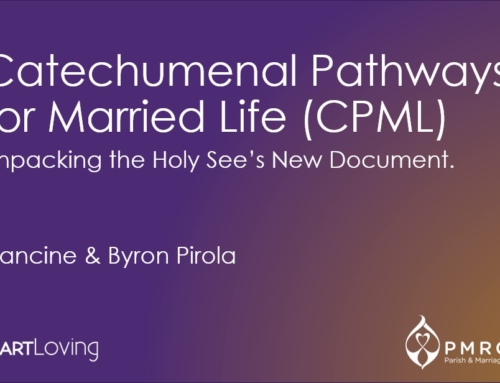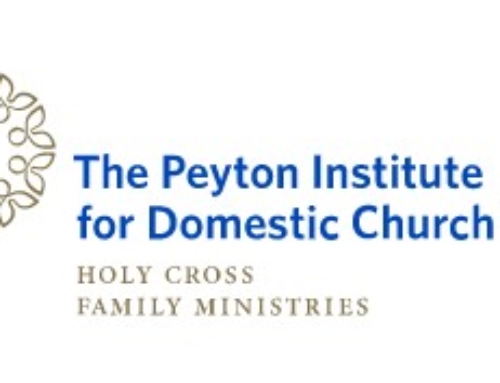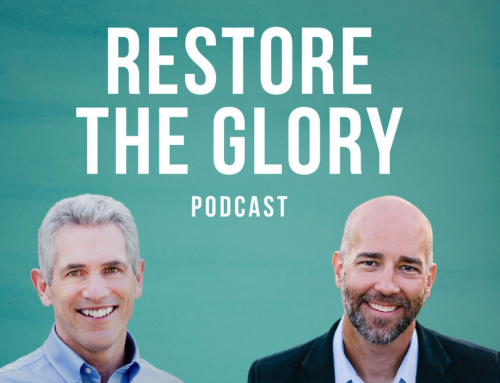In his book, One Flesh, published in 1980, Fr Chuck Gallagher explores the role of Matrimony in the life of the Church. The first chapter, Looking for the Way, appears below.
All of us agree today that the Church is in trouble all over the world. Certainly knowledgeable people in Europe have been talking for decades about the de-Christianization of the population. Ever since Vatican II we in the Church have become more and more aware of the deep underlying malaise that has existed for a long time, but we have only begun to recognize it recently. We can put a lot of reasons on it, people can analyze it to death, but the basic fact of the matter is that people are having more and more difficulty with the Church.
People, of course, have always had a difficulty with the Church, right from the beginning. Faith after all is a gift. Furthermore, the Church expects a lot of us, so there has always been not only a problem in accepting the mission of the Church and the truth and beauty of the Church but also in living up to what it expects of us.
However, what we’re experiencing in today’s Church is quite different. It is very good and sincere and faithful people who are having the difficulties now, people who in times past would have been our backbone. People who have received the Sacraments for years, people who have been exposed to Catholic education practically all of their lives are turning down the Church – or at least, are very reluctant to get too involved in the Church. Many people are still going to Church, but their heart is really not in it. They are going because they have always gone or because they don’t want to let their parents down or because they have a sense of guilt when they don’t go or because they judge that some religion is good for their children – therefore, they should give them good example.
If we were to look at an overview of people in the Church, it would seem that they fall into one of several broad groups, all wanting to loosen their ties with the Church, not wanting to be too identified as Catholic.
One group believes that we have to get away from denominations; it is just the Lord that counts and we have to allow the Lord to take over our lives. The Church, then, at best, fits into the periphery of that relationship with Jesus. Theirs tends to be a rather passive experience of Church. Naturally, there is some real truth in this – good people don’t do bad things; Jesus really is the Lord and our whole way of life has to revolve around him. But their relationship is too much with a disembodied Jesus, leaving out the dimension of the community of love, the Church he has established to be the prime way we express our relationship with him. They have found the Lord in isolation from his people and they are happy enough with fellowship. Jesus offers his Body and they settle for fellowship – an association of good people who have had a common experience.
Another group makes Jesus a good religious teacher who has good ideas and good norms to follow. For them, the real thing is having humanistic ideals and taking care of people. Once again, the Church fits in, insofar as it follows those ethical norms and insofar as it advances the course of social justice, peace, etc. Such an approach enables people to stand outside the Church and to judge her. It makes our relationship with the outside world more important than our relationship with one another. It calls for us to relate to people not in terms of their personhood, but in terms of some external circumstances such as poverty, need, hurt, oppression, etc.
Such people frequently have deep personal relationships and involvement with people who share their light and their vision. The difficulty is that so many of these communities are without the Lord. They may very definitely be real believers in the Lord, but it’s a Lord who is a director of social ministry rather than a Lord who calls them to belong to one another and to let the compassion for others comes out of that belonging.
A third group has just a great deal of indifference; they have retreated into their own little world of taking care of their own interest. Probably the vast majority of people in the Church today, certainly the practicing people, would fall into this category. Their morale is low; they are confused and directionless. They don’t know whom they can trust in the Church. As a result they have withdrawn and become for all practical purposes practicing non-believers. They do the right Catholic things the appropriate number of times, but their hearts are unconverted. They have settled just to live their own lives, to get ahead and satisfy themselves. People who have degenerated into that kind of state have not done so of their own free choice; they simply see no other option. They see the Church as calling them to some other-worldliness, either in terms of a disembodied spirituality or an idealistic do-goodism. The choices offered them are so exacting and narrow that their hope and vision is limited and lifeless.
Attempts to renew the Church and change this whole situation, however, usually start at the wrong end. We examine what is wrong with the official Church, instead of looking at what people are saying, what they are looking for, what they need and what they are expressing as their desires. After all, it is the baptized people that are the Church. Too often we look at philosophies and theologies rather than the experience of the faithful. We have just got to start with the people. Unless we speak to them in their language, we are never going to be heard, because we are just talking abstractions.
Unfortunately, in just looking at the institutional Church, and seeing what changes have to be made there, we overlook the fact that the basic problem in the Church is not the institution. Much more important is to look at what our relationship is with one another and who we discern ourselves to be. This is not to say that the institution doesn’t have to be changed and changed drastically, but we could have the world’s most perfect institution within the framework of the Church, and that will not fundamentally change the way people react to the Church. The change in the Church has to be much more radical than trying to revise our theologies, our canon laws, our parish structures and so on. It is the society itself, the people of the Church, that is going to have to change.
This is not to suggest, then, that structural changes have no relevance at all. Great changes obviously have to be made, not simply because the structures are inadequate in themselves and frequently positively harmful, but more importantly because they are a symbol of how we have depersonalized one another as Church and reduced our being Catholic to function and practice. But they are really not the main point. That is not facing into what the general population of the world is saying to us.
They are saying fundamentally that we are irrelevant, that they don’t at all see the Church as adding an extra dimension to their lives. They don’t see the Church as putting any fresh meaning into life. They don’t see the Church as bringing anything to them that they don’t already have.
No, changing the structures is not the answer. We just have to look around for some other way to make the Church vital, different and meaningful in today’s society.
In addition to looking to people we need to look to Scripture. For Scripture tells us what that way is. The Bible makes it very clear to us how the Church is to be revealed:
“Husbands should love their wives just as Christ loved the Church and sacrificed himself to her to make her holy. He made her clean by washing her in water with a form of words, so that when he took her to himself she would be glorious, with no speck or wrinkle, or anything like that, but holy and faultless. In the same way husbands must love their wives as they love their own bodies; for a man to love his wife is for him to love himself. A man never hates his own body, but he feeds it and looks after it, and that is the way Christ treats the Church, because it is his body, and we are its living parts. For this reason, a man must leave his father and mother and be joined to his wife, and the two will become one body. This mystery has many implications, but I am saying it applies to Christ and the Church. To sum up, you too, each one of you, must love his wife as he loves himself, and let every wife respect her husband.”
St. Paul is stating very clearly and bluntly that the way the community of believers, the Church, is loved by Jesus is revealed by the way husbands and wives in the Church relate to one another. So consequently the Church has to work on that. We have to examine and see clearly just how our Catholic husbands and wives are revealing the relationship of Jesus and the Church.
We are to be a community of love. That’s what the Church is. We, these believing people, are to be a community, are to belong to one another with him as our head.
Even in human terms, this makes a great deal of sense. The whole world is screaming for community. Everybody admits the need for community – from sociologists and academics down to the normal man on the street. No one can deny the tremendous heartfelt need for closeness, roots, involvement in the lives of others, and for a caring community. We all want to care for others and be cared for by others.
And that is what is held out by Jesus. That is what the Church is all about – to bring alive the statement of Jesus that we are to love one another as he has loved us.
But in order to understand this community of love we are called to be, we have to get back to St. Paul’s great mystery. That is our bedrock – that the way a husband loves his wife reveals how Jesus loves the Church. We need to look to Matrimony. We need to examine it and see that our married people understand their own significance.
One of our problems, though, is that we don’t have an adequate understanding of any vocation, never mind the vocation of Matrimony. We keep mixing career and vocation. For example, we make being doctor or a lawyer or a teacher a vocation. It’s not – it’s a career, and a very good and very beautiful career that offers the possibility of a high level of service in accordance with the Gospel. but service (or ministry) looms too large in our consciousness. It takes too big a place in our understanding of what being Gospel is. We think the prime, almost exclusive mission Jesus Christ has called us to, is one of service rather than one of love, or to be more fair about it, we’ve equated love with service.
Service can be and frequently is an expression of the love that exists between people, but the real love is the relationship we establish with one another and that is only symbolized by what we do for one another.
Really, there are only four vocations in the Church: Matrimony, Dedicated Single Life, Religious Life and Priesthood. Each one of these vocations is a unique way to love within the faith family. The fact is that a vocation doesn’t focus on what we do. It’s a call to a specific relationship to the rest of the faithful. It is this relationship with the people of the Church that is our call and it is this we have to spend our life to establish.
How we exercise our talents can be our career. It might be as a librarian, a teacher, a director of religious education, a counselor, a social worker or what have you. Career or profession, then, concerns itself with ministry. Whereas vocation concerns itself with a way of life. Fundamentally, being a member of the Church is to commit myself to a way of life.
All too often, however, we look on vocation in terms of what we do: What do I do as a priest? What do I do as a sister? What do I do as a committed baptized-confirmed person? But that’s the second question. The first question and the basic one for the adult in the Church is: What fundamental relationship am I going to have with the people of God? As a celibate in Orders? As a celibate in community? As a married person? As a celibate lay person?
Only then can I ask myself: “How am I going to spend that relationship in your midst? How am I going to spend my marriage? My Orders? My community? How am I going to express, in concrete terms, my relationship with my fellow believers? Whether that relationship is direct, such as priesthood, or indirect, such as marriage or religious life.
And when we grasp this idea of vocation, then we can begin to approach an understanding of the Sacrament of Matrimony and therefore of the Church.
It is only by understanding the Sacrament of Matrimony, in fact, that we can start to understand the Church. For in the case of both, what we’re talking about is people, not structures, not activities, not institutions, not rituals. When we talk about the Sacrament of Matrimony we’re talking about the sacramental couple; when we’re talking about Church we’re talking about this specific community of believers, this faith people. In no way are we trying to deny that the hierarchy and organization and structure are part of this whole thing, but the Church in essence is these specific faithful people in their relationship to one another in the Lord. All of us are called to be a people.
We have not yet really internalized, however, that the person is the Sacrament. Despite all the good theology that has come about recently and all the hard work, there still is a very real inclination within the Church community to look on the Sacraments as something done to us and of which we are passive recipients. Yes, we know we have to accept them and we have to have a vibrant faith for the Sacrament to be meaningful and to take full effect. But we don’t see ourselves as active participants in the very creation of the Sacrament. We still tend to look on the Sacraments as only rituals, as actions performed by the Church as an institution. We don’t see the Sacraments as persons of the Church interacting upon one another; as calls to establish a love bond between us; as calls from our family to love that family in a very special way. The net result, despite all the beautiful words to the contrary, is that we still see the Church as a thing rather than us.
As long as the Sacraments remain something that are done to us as individuals, as long as we look on these experiences as private ones for our basic spiritual self-improvement, then we’re never going to see the reality of the Church and that’s especially true in regard to the Sacrament of Matrimony. For Matrimony is a sign of the Church.
Much of what is said in this book is going to be about Matrimony because you can’t talk about the Church without talking about Matrimony. Also, you can’t talk about Matrimony without talking about the Church. The reality is that we almost never connect the two at all. At best we make some references to Church when we talk about the Sacrament of Matrimony, but we don’t see Matrimony as an essential dimension to true understanding of Church. Consequently, we feel perfectly free to talk about Church without any reference to Matrimony at all. The tragedy is that whole books can be written about the Church without a single word about the Sacrament of Matrimony.
A response often made to that statement is: “Well, what’s surprising about that? Of course Matrimony is an aspect of Church living, but we can take the Church from many dimensions and perspectives and not consider it from the point of view of Matrimony”. That basically is what his whole book challenges. We can’t do that. The Sacrament of Matrimony is a dimension of Church experience essential to any true comprehension of the Church – and not just to those of us who are married. One cannot be either understood or experienced without the other. It would simply be incredible to even consider Church without any reference to the Eucharist. So too it is equally incredible to seek to discern who we have been called to be by the Lord without looking at the model he himself established to provide the basic prophecy to our identity.
In this book we are looking at Matrimony in the Catholic Church and we are going to consider the Church in terms of those who call themselves Catholics. Obviously, this is a restricted use of the term. It provides very real limitations. The Church is obviously broader than those who are baptized Catholic. But there are very definite dimensions to being Catholic that provide insight, understanding and richness to any study of the Church. Moreover, the sacramentality of Matrimony is at least as highly developed if not more so in the specific faith community as in any other. So, in no way is there intended to be any elimination, implied or otherwise, of other Christians from the Church, the Body of Christ, the Community of Love. There is no exclusivity or triumphalism here. We will merely be limiting our perspective in order to seek a greater clarity.
Questions for Discussion
- How important is an understanding of Matrimony to our understanding of the nature of the Church?
- Do you agree that a vocation is not about what you do, but about the nature of your relationship with respect to the Church?
- What’s the difference between a vocation, a mission and a ministry?
Leave your comments below and be part of the discussion.







I found Fr Chuck’s definition of vocation interesting… it has become commonplace for Catholics in lots of ‘helping’ professions to talk about their ‘vocation to teaching’, or their ‘vocation to nursing’ etc. I had assumed this was a way of differentiating and elevating their commitment to their ‘career’ beyond personal development to something that was grounded in their evangelical mission.
I suppose though, that in Fr Chuck’s definition, he would say that they have a ministry, but not a vocation. If they are married, their vocation is Matrimony, and their ministry is teaching or nursing or medicine, or whatever. If they happen to be a religious sister or brother, their vocation is as a sister/brother and their ministry is teaching, nursing, social work, etc.